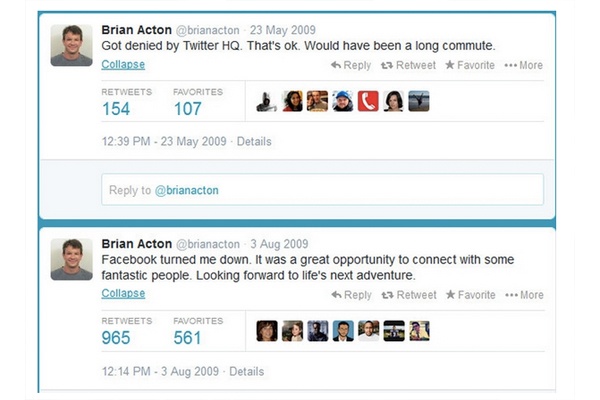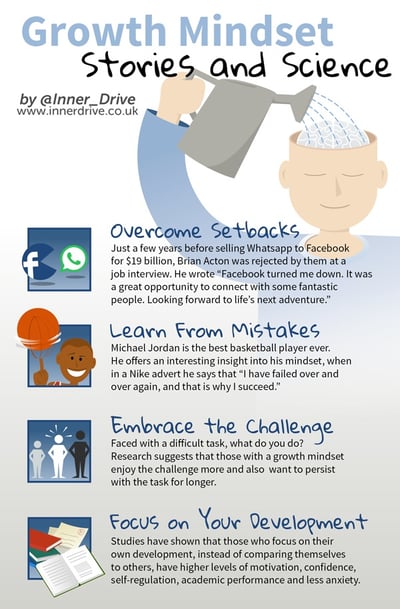Growth mindset is arguably the most popular psychological theory in both education and sport at the moment. It makes intuitive sense; if you work hard and learn from your feedback, then you will probably improve your ability.
We have previously blogged about how we think telling stories about people who have demonstrated a growth mindset and providing research from peer reviewed journals is a powerful combination. So here are a few more growth mindset stories and science:
Story #1
In early 2009 an American called Brian Acton desperately wanted to work for a big social media company. First, he tried to get a job with Twitter. When that failed, he applied for a role at Facebook. Unfortunately, they didn’t want him either. He even tweeted about these setbacks:

Unperturbed, he refused to believe that these two failures meant he shouldn’t be in the social media business and set up his own company. Fast forward a few years (and a lot of hard work), and his new company, Whatsapp, was purchased by Facebook (the same company that in 2009 turned him down). How much did he sell Whatsapp for? $19 billion dollars.
Story #2
Michael Jordan is arguably one of the world's greatest ever basketball players, maybe even the world's greatest athlete. In the video below, he offers an interesting insight into his mindset when he says that ‘I have failed over and over and over again, and that is why I succeed.’
What does he mean by this sentence? Some say it highlights how setbacks motivated him to achieve more. Others suggest it shows that he doesn’t let failure dent his confidence. As well as these two answers, we’d like to think it highlights something more. Perhaps it shows that he fails and then learns the lesson why. He might fail again for another reason, but he learns that lesson. He essentially goes through his life collecting lessons, and that is what helps him achieve his success.
Science Research #1
This seminal journal by Mueller and Dweck effectively launched the concept of Growth Mindset. It’s quite a long read, as it highlights six different studies they did, but it's definitely worth it. One of the studies investigated how children react when faced with a difficult task.
Children who had previously been praised for effort (and therefore promoting a growth mindset) enjoyed the challenge more and also wanted to persist for longer, compared to their peers who had previously been praised for ability (promoting a fixed mindset).
Since this study, praising 'effort over ability' has become staple advice for those wanting to help their students or athletes develop a growth mindset. This makes sense; by praising ability, we don't provide information about how they can be successful again in the future. Instead, by praising effort for a previous success, we are subtly telling them that lots of effort is required in future tasks. This effort is within their control and provides a template for them to follow.
Science Research #2
This study was the basis of some of Carol Dweck's early research. It looked at how young students explained their successes and failures. Success tended to be attributed towards effort, and failure based on luck or ability.
This study also looked at how students viewed an upcoming test – was it a chance to test how much they had learnt, or more to compare themselves to their classmates? Since then, several studies have found that students who compare themselves to others (a characteristic often associated with a fixed mindset) tend to have lower levels of motivation, confidence, self-regulation, academic performance and increased anxiety.
One possible reason for this relates to a sense of control. As you can't control what other people do, this gives you less certainty over the situation. By focusing on yourself and your own development, the situation is more manageable and therefore less stressful.
Final Thought
Here are just a few examples of stories and science on Growth Mindset. We have lots more planned for the coming months, so keep a close eye out for them. If you can’t wait, check out how to develop a growth mindset, stories about growth mindset or our award winning book.
For even more info take a look at our page How to Develop a Growth Mindset, where you'll find links to blogs and research.








